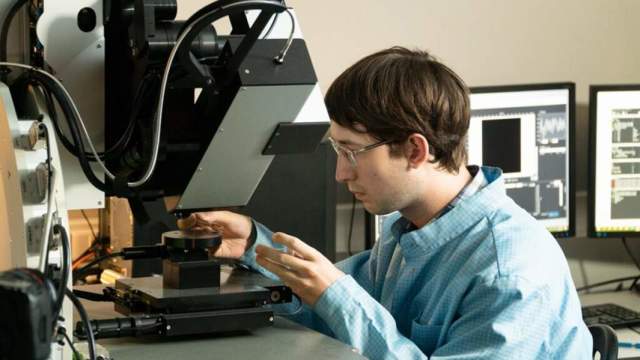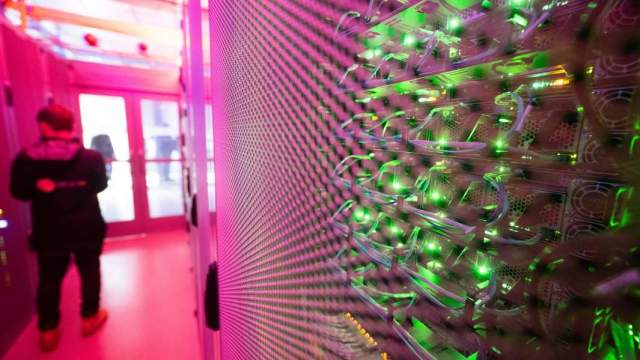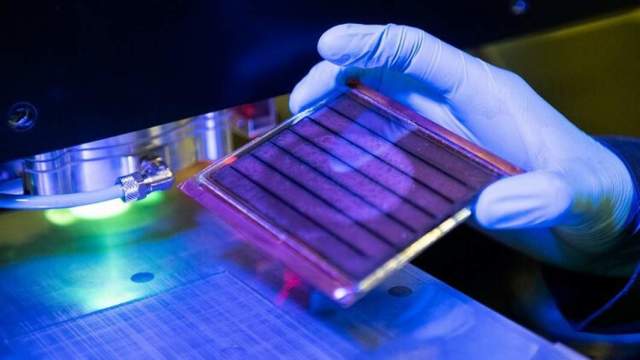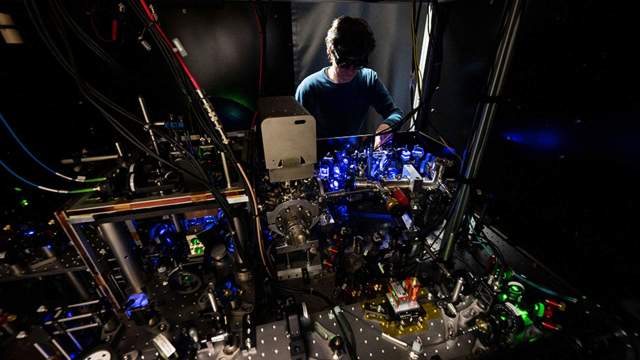What material will optical computers be made of
Russian scientists have experimentally confirmed that gallium phosphide nanocrystals can be used to create microcircuits in photonic computers. These machines will be much faster and more energy efficient compared to electronics, so developers around the world are struggling to create them. Russian experts expect to collect the first working samples of photon chips in the next few years. According to experts, the work done by scientists will certainly find practical application, but it is important that the achievements obtained in laboratories can be repeated in the mass production of fundamentally new computers.
Light in the details
MIPT physicists have found a material that is best suited for creating optical chips that work by transmitting light particles — photons. They conducted a series of experiments that showed that the physical properties of gallium phosphide (GaP) nanocrystals make it possible to make the simplest elements of a future photonic computer out of them.
For example, GaP has a high refractive index. This means that light with a small wavelength propagates well through nanoscale crystals of this material. This makes it possible to make the most miniature optical components out of it. Based on the data obtained, the scientists calculated the minimum thickness of the crystal for transmitting a light signal of a particular color.

Researcher at the MIPT Center for Photonics and Two-dimensional Materials in the laboratory
Image source: Photo: MIPT Press Service
— In order to make a computer that will work on light signals, it is necessary to create small optical elements that make up its chips. That is, we need to fit the light into very small elements. This requires a material with a high refractive index and low optical losses during light transmission. Gallium phosphide turned out to be one of the most promising in this sense," said Alexey Bolshakov, head of the Laboratory of Functional Nanomaterials at the Center for Photonics and Two—Dimensional Materials at MIPT.
All calculations in modern computers are performed due to the movement of electrons through the elements of microcircuits, primarily transistors. With the development of technology, transistors could be made smaller and smaller — up to a few nanometers. Thanks to this, several billion similar devices can be placed in one computer.
However, scientists note that transistor technologies have approached their limit — it will not be possible to make them even smaller, since quantum effects are already beginning to interfere with their work. In addition, the speed of electronic devices is limited by the speed of movement of electrons. Photons move much faster. But their main advantage in comparison with electronics is low energy losses during propagation. This determines their low power consumption. According to experts, it may be several orders of magnitude smaller. For this reason, the best specialists around the world are struggling to implement the idea of an optical computer.
Light wires
A necessary component of future photonic computer chips will be a waveguide — that is, a channel through which a light signal will move, passing from one logical element to another. Experiments have shown that the minimum thickness of such a "light wire" made of gallium phosphide is 108 nanometers, which is enough to create the first experimental samples of microcircuits.
Also in their work, scientists have shown that waveguides from GaP can be bent very strongly and at the same time they continue to conduct light. Thanks to this, more complex elements can be made of them, such as splitters that separate or unite light streams.

Photo: Global Look Press/Sebastian Gollnow
Image source: iz.ru
— The simplest splitter is two filamentous crystals that lie side by side. We directed a beam of light into one of them. It turned out that the light signal spread both along the waveguide into which we directed it, and into the one lying next to it, although they are not mechanically connected," said Alexey Bolshakov.
This effect will make it possible in the future to make more complex optical elements that will filter only a part of the light stream with a certain wavelength (spectral separation), and create light logic elements that will replace electronic transistors, MIPT explained.
Scientists also plan to develop miniature light sources that will match the size of waveguides and splitters. According to their hypothesis, the same filamentous nanocrystals of gallium oxide can be used for this if modified with other substances, such as arsenic. Experts plan to receive the first simplest microcircuits based on new principles in the next few years.
Like a pipe in a water pipe
— It is important that the authors presented a prototype of an optical pair of two GaP nanowires and implemented spectral signal separation. The limits of mechanical strength are demonstrated, which is necessary to create real logic circuits on micro- and nano-waveguides. In fact, the operability of one of the key nodes of photonic logic circuits is shown. The development has a high practical potential for next—generation computing systems," said Danila Saranin, head of the Laboratory of Advanced Solar Energy at NUST MISIS.
Research on waveguides has been conducted for a long time. Perhaps the use of gallium phosphide is really technologically justified, explained Peter Fedorov, associate professor of the Spintech Institute of the National Research University of MIET, to Izvestia. However, according to him, the most important thing in a chip is not a conductive element, but a logical one — a transistor. The waveguide plays the same role as the pipe in the water supply. Nothing will change fundamentally in the whole system from changing its size.

Prototypes of solar photomodules
Image Source: Photo: NUST MISIS
— However, the ability to filter light using gallium phosphide nanocrystals, which opens up new prospects in the creation of logic components of the chip, is an excellent result of scientific work. But the main question that arises after laboratory success is whether it is possible to get the same results at least with small-scale production. If gallium phosphide provides this, then it will be put into practice," said Pyotr Fedorov.
The work was carried out in cooperation with Alferov University, ITMO, HSE and Yerevan State University with the support of the Russian Science Foundation.
Denis Gritsenko


